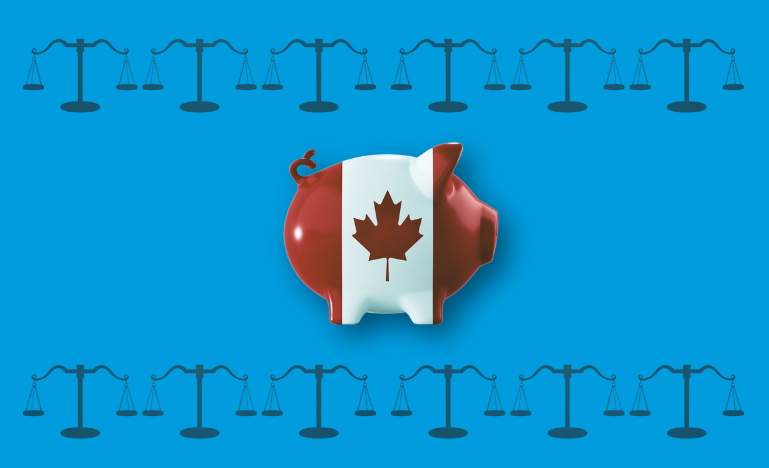What’s in Budget 2024 for the justice system?
The federal budget promises increased funding for legal aid in criminal and immigration matters and contemplates the reallocation of judicial positions.

The 2024 federal budget contains several measures for the legal system, most of them having to do with new funding for legal aid. It also includes reallocated funding for unused judicial positions, as well as promised legal assistance for renters. There are also criminal measures being announced for auto theft and financial crimes, as well as more funding for the government's Indigenous justice strategy.
“Alberta has been allocated judicial seats which they have chosen not to create, resulting in 17 unused judicial seats intended for unified family courts. This slows down Canadians' access to justice,” the document reads.
“To accelerate Canadians' access to justice, the federal government is appointing more judges where they are needed, and will be used.”
To this end, the budget proposes to reallocate $50.2 million over five years, with $10.9 million ongoing for the Office of the Commissioner for Federal Judicial Affairs to redistribute those 17 seats to provinces who need them. This will also mean amending the Judges Act to move the positions from Unified Family Courts to provincial superior courts.
This move comes at a time when there’s been plenty of discussion about judicial vacancies in Canada.
In February, a Federal Court decision said the federal government has failed Canadians by letting the number of judicial vacancies reach an “unacceptably high” level and ordered it to appoint judges within a “reasonable time.”
Last year, Supreme Court Chief Justice Richard Wagner also expressed concern about the situation in Canadian courtrooms in a letter to Prime Minister Justin Trudeau.
The budget also announces the intention to launch consultations on repealing the residency requirements for Federal Court and Tax Court judges for the sake of allowing for a wider and more diverse pool of applicants.
As for legal aid, the bulk of the funding will see $440 million going to criminal justice system legal aid, starting with $80 million in 2025, to be followed by $90 million for the four years that follow. In addition, there are new funds for immigration and refugee legal aid, with $273.7 million over five years, starting with $72 million over 2025-26, and $44 million for the following three years, to be followed by $43.5 million ongoing.
As for the federal online harms legislation that has yet to be passed by Parliament, the budget includes a proposed $52 million over five years, starting this year, to protect children and set up the Digital Safety Commission.
The government also announced the creation of a Tenant Protection Fund, which proposes to provide $15 million over five years to fund organizations that provide legal and informational services to tenants, as well as for tenants’ rights advocacy organizations to raise awareness of renters’ rights.
There are also measures to try and put the brakes on auto theft in Canada, given the record high and rising number of vehicles stolen each year, something the Insurance Bureau of Canada says is a crisis.
The budget proposes amendments to the Criminal Code that will create new offences stemming from the use of violence or links to organized crime as it relates to auto theft.
There are also intentions to table legislative amendments to the Proceeds of Crime (Money Laundering) and Terrorist Financing Act, the Criminal Code, the Income Tax Act, and the Excise Tax Act, all with the aim of strengthening the fight against financial crime, some of which will give FINTRAC new powers. New Criminal Code provisions will include allowing courts to issue a repeating production order in order to get ongoing and specified information on account activities connected to a person of interest in a criminal investigation. As well, they propose to allow CRA investigators to seek general warrants through court applications, modernizing and simplifying their evidence-gathering processes.
“Advancing reconciliation requires supporting Indigenous-led, culturally appropriate, and community-based justice services, and ensuring policies are informed by the lived experiences of First Nations, Inuit, and Métis,” the budget says.
There’s also money to finalize the Indigenous Justice Strategy, in consultation and cooperation with Indigenous Partners, provinces, and territories, as part of the government’s commitment to UNDRIP. That’s been allocated $87 million over five years, and $11.3 million per year ongoing. It includes funding for the Indigenous Justice Program and Indigenous Courtwork Program, $5.5 million over three years to continue work on revitalizing Indigenous laws and legal systems, and $25.1 million over three years to continue the work of capacity building and engagement through the development and implementation of the strategy.
In all, there are 62 legislative changes that measures included in the budget will require. This includes promised amendments to the Impact Assessment Act in order to bring the legislation into compliance with the Supreme Court of Canada’s reference decision, expanding the designated equity groups under the Employment Equity Act, establishing a right to disconnect under the Canada Labour Code, and amendments to the Immigration and Refugee Protection Act to streamline the intake, processing and adjudication of asylum claims.


